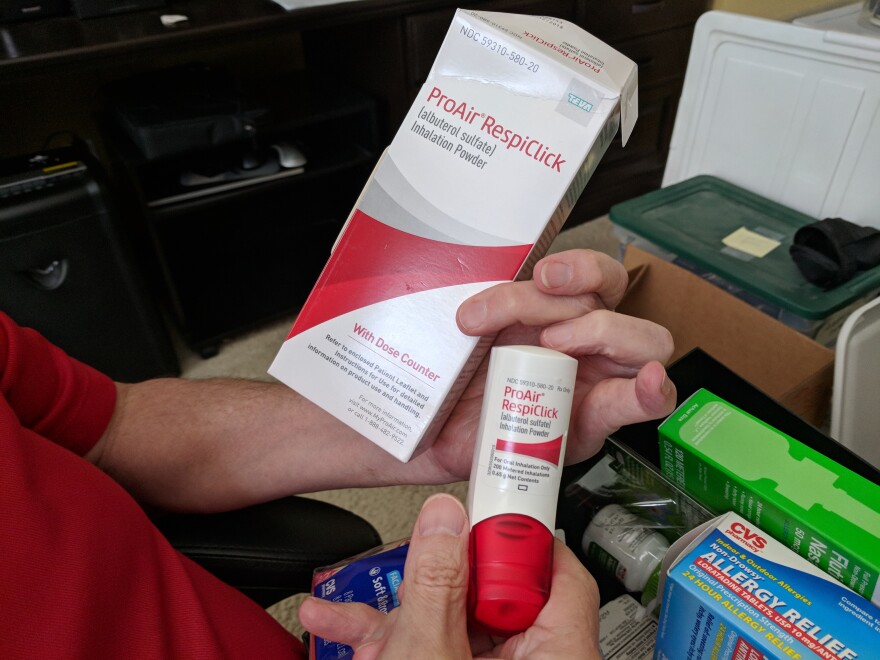When buying a house, everyone’s motivation is different—maybe it’s the desire to start a family, or to start a new job in a new city. Today, we report on a people who move out of the Valley for an entirely different reason—one that’s related to the Valley’s ozone concentrations, which have been creeping higher as the temperature has risen.
Judy Eymann-Taylor is packing. She picks up a gold picture frame leaning against a wall and gingerly cushions it in bubble wrap. “This is a photo that's almost 40 years old now,” she says.
In a few weeks, she and her husband John Taylor will load this and everything else in their Fresno home onto a moving truck bound for Utah. “We are keeping the bubble wrap company in business,” she laughs.
But she has to stop packing when her husband, who’s been coughing in another room, walks stiffly into the kitchen. “I'm having an asthma attack right now,” he wheezes. “You don’t sound good,” she agrees, as he pulls out his rescue inhaler.

About 15 minutes later, she, too, begins coughing. “You're already showing signs, hon,” Taylor tells her as he hands her the inhaler.
The attacks are an unwelcome reminder of why they’re moving, leaving behind most of their six kids and 11 grandchildren. “It's the air that's the key,” Taylor says. “We wouldn't be doing this if it wasn't for the air.”
And in southwest Utah? Taylor says the air is clean, the red hills and mesas clear in the distance.
Taylor and his wife both developed asthma as adults. They manage it with pills and inhalers, and by staying inside when air pollution gets bad. But that’s not the quality of life they want. Taylor sometimes refers to his house as a jail cell. “You can't go out and put 11,000 steps on your pedometer by staying inside a 1,300 square foot house,” he says. “Or a 400 square foot apartment.”
Taylor says they were trying to make their retirement work in Fresno. But their doctor finally advised against it. “He recommended: Get out now,” he says. “And after trying some super-mega-doses, the aftereffects were so brutal that I said you know what, if we stay here another year we're going to die here.”
This is a familiar story to Marie Iden. She’s a real estate broker specializing in the foothills of Madera and Mariposa Counties. She works with clients from all over the state, but those from the Valley commonly come to the foothills for the same reason. “The ones that’re coming from Fresno, they are interested in getting out of the fog and the smog,” she says.

Despite marked improvements in air quality over the last few decades, many Valley cities rank among the most polluted in the country. We don’t know how many people that scares away, but it’s not an insignificant number. When we asked on Facebook who had left because of the air, we got almost two dozen responses.
Responses from people like Samuel Baumgardner, an engineer who spent four years in Fresno. He and his fiancée moved to Santa Rosa once they began talking about starting a family. “If we’re going to have children, we’re not going to risk the health problems associated with air pollution,” he says.
Then there’s Mahogany Ayele, a nurse practitioner who left Bakersfield for San Diego in 2013 after the birth of her first child. She says he was born small and he caught pneumonia early on. “He was just sick on breathing treatments all the time the first year of his life,” she says.
Air pollution has very real health consequences. It’s not known to cause asthma, but it can exacerbate it. Almost every Valley county has a higher asthma prevalence than the state average, and state data show that from 2008-2010, asthma killed more than 120 Valley residents. Some pollutants have also been linked to cardiovascular diseases, reduced immune function, preterm birth and low birthweight.

So are the health risks chasing away enough people to make a dent in the Valley’s economy? Not likely. Overall, the Valley is growing. The fastest growing county in the state is Merced County.
And Dennis Yee, a recruiter for Valley Children’s Hospital, says air quality hardly ever comes up when talking with job candidates. “They may look at the crime rates, they may look at the air quality, but when they look at it in comparison to the other cities in California I don’t think it becomes a huge issue,” he says.
Nonetheless, John Capitman, director of the Central Valley Health Policy Institute and a board member with the Valley air district, is frustrated we don’t know more about the economics of air pollution. “We really have a renewed need to talk about: Are we making the best investments, and how can we continue to move the region forward?” he says.
Capitman argues we need an understanding of things like how many people leave, and why, and whether that’s changed as air quality’s improved. “That really is remarkably absent from the literature,” he says.
When Judy Eymann-Taylor tells people why she’s moving, she’s surprised by what she hears. “The response from a whole lot of people is, ‘I wish I could do that. I'm miserable here,’” she says.
Perhaps, if everyone who wanted to flee the Valley to escape air pollution did, we might have a real economic problem on our hands.





